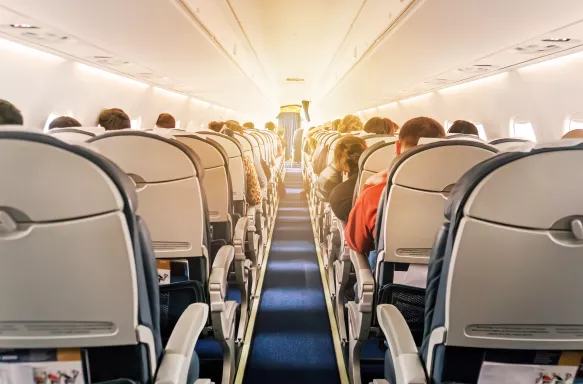Expert Travel Tips to Beat Jet Lag Symptoms

Expert travel tips on jet lag – jet lag symptoms to look out for and what causes jet lag.
If only resetting your body clock to a new time zone was as easy as changing the time on your phone or watch. Unfortunately, while technological and engineering advances mean we can now travel across several time zones in just a few hours, our bodies have yet to catch up. This means that whenever you fly across time zones, your body’s internal clock is disrupted – potentially triggering jet lag symptoms.

What Is Jet Lag?
Jet lag, medically termed desynchronosis, is simply the result of our bodies not being adapted to high-speed travel. Everyone, from seasoned travellers to babies, and first-time fliers to flight attendants, can be affected.
Our brains become accustomed to the daylight hours of wherever we are. A sudden change in the time the sun rises and sets results in your brain’s normal programming being disrupted. You feel tired when you should be at your most wakeful, and you feel wide awake and bright-eyed when the stars are out and you should be sleeping.
What Causes Jet Lag?
The body is tuned into what’s called a circadian rhythm – basically our body’s internal clock, which is based on sunlight. During daytime hours, light enters your eye. This, in turn, triggers information to be sent to the part of your brain called the hypothalamus, which controls the pineal gland. It’s here, in the pineal gland that certain chemicals are produced which either help keep us alert and awake or make us relaxed and sleepy. During the day, the pineal gland creates serotonin; at night, this is processed to become sleep-inducing melatonin.
When this system is disrupted by the sun suddenly rising or setting at a different time – as is the case when you travel across time zones – the body takes a while to readjust, leaving you feeling wakeful or sleepy at the wrong times. How long you fly isn’t as relevant as how many time zones you cross – flying north or south, for example, won’t have much effect as the sun will rise and set at approximately the same time; flying east or west is the problem.
Scientists estimate that it takes around 24 hours for the body to readjust after travelling across two time zones. If you fly across six time zones, for example, it can take up to three days before you feel perfectly normal again.

Who Is At Risk Of Jet Lag?
You’re at more risk of jet lag symptoms if you don’t get much rest during the flight, if you’re anxious and if you don’t drink enough water or eat properly. Underlying medical conditions such as lung or heart disease or diabetes can make symptoms worse, too. Older people may find they take longer to adjust to the new time zone than their younger peers. Fitter individuals tend to show milder symptoms and recover quicker, too.
There is evidence that flying from west to east causes more problems than flying to the west. While scientists aren’t certain why this is, they believe that it could be down to the simple fact that it’s more straightforward to delay the body clock (go to sleep later than usual) than it is to advance it (going to sleep earlier than usual).
Common Jet Lag Symptoms
Jet lag symptoms aren’t life-threatening but can be disconcerting. Sleep disturbances, fatigue or insomnia at the wrong time of day can be off-putting and can trigger anxiety and confusion in some people. Associated symptoms include headaches, malaise, irritability, dizziness, loss of appetite, nausea and diarrhoea. Some of these jet lag symptoms may be a result of us behaving differently when we are fatigued or awake at the wrong times of day – we may not eat our regular meals, for example, which can lead to indigestion or lack of energy.

How To Avoid Jet Lag
There are several things you can do to avoid or minimize the symptoms of jet lag:
Pick your flights – If you can, try to choose a flight that arrives in the early evening (local time). You’ll likely be tired after your flight, even if you manage to sleep for some of it, so you’ll then be able to sleep at night-time at your new destination.
Wear an eye mask – If you’re on the plane and being exposed to sunlight at a time when it will be dark at your destination, wear an eye mask. This way you avoid the brain getting clear signals that it should be awake at this time.
Set your watch – Before you leave, set your time to the time at your destination. That way, you will be conscious of when you would be asleep or awake and you can adjust your behaviour accordingly.
Drink plenty of water – Cabin air can be dry so you need to drink extra liquid during the flight. Avoid caffeine and alcohol, both stimulants that may exacerbate your jet lag symptoms
Get up and move – If the seat belt sign is turned off and it’s daytime at your destination, moving around can help you feel awake. If you’re seated, you can do small foot and leg movements, as well as your hands, wrists, and shoulders. It’ll also help prevent you from feeling stiff after the journey.
Plan your trip to arrive early – If you want to ensure you’re in tip-top shape for your trip or a specific event during your trip, such as a planned city tour or event, you might want an extra day to give your body time to adjust beforehand.
Don’t leave tired – Even though it might seem sensible to avoid sleep in order to get your body ‘in training’ for the new time zone, you’ll find the opposite will occur if you travel when overtired. The more tired you are before you fly, the worse your jet lag symptoms will be.

How To Cure Jet Lag
Once you’ve arrived at your destination, use these techniques to recover from jet lag faster:
Expose yourself to sunlight – When you arrive at your destination, it’s best to be outside or in a well-lit room so you get that all-important light hitting your retina and letting your brain know it’s time to produce substances to keep you awake.
Avoid jet leg flying west – If travelling east to west, try to expose yourself to light in the evening. This is because when you arrive, you’ll be going to bed later, so exposing yourself to later light will help you adjust quicker.
Avoid jet lag flying east – If travelling west to east, expose yourself to morning light so that the following morning your body won’t be shocked by the earlier wake-up time.
Travelling across many time zones – If travelling more than eight time zones from your original time zone, try to follow the new time zone as far as possible, exposing yourself to daylight and going to bed close to when the sun sets. And if you’re exhausted and really can’t keep your eyes open, take a very short nap. Set a timer or alarm for 20 minutes and let yourself sleep. Longer naps can cause grogginess and/or inertia and will hinder your body’s ability to adjust to the new time zone.
While jet lag symptoms can be debilitating, it’s not a serious condition. Using our tips and advice, you can make the transition from one time zone to another as smooth and easy as possible. The symptoms will pass quickly and then you can relax and enjoy your holiday to the full.

Alternatives To Flying
Want to avoid jet lag altogether? Try Riviera Travel’s Rail tours or holidays by Eurostar including the five best no-fly river cruises in Europe such as the Bruges, Medieval Flanders, Amsterdam And The Dutch Bulbfields River Cruise and the Enchanting Rhine And Yuletide Markets River Cruise, which is perfect over Christmas.
If you have any questions, please do not hesitate to contact us.



